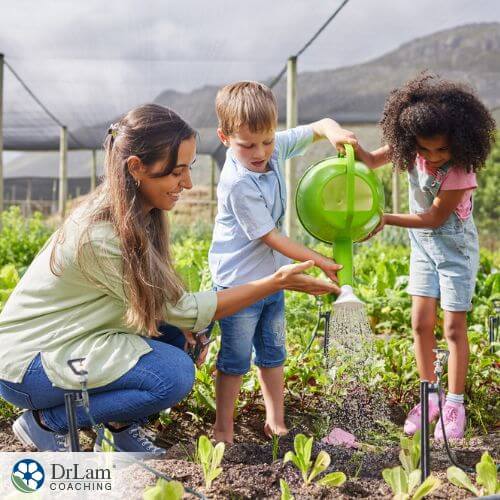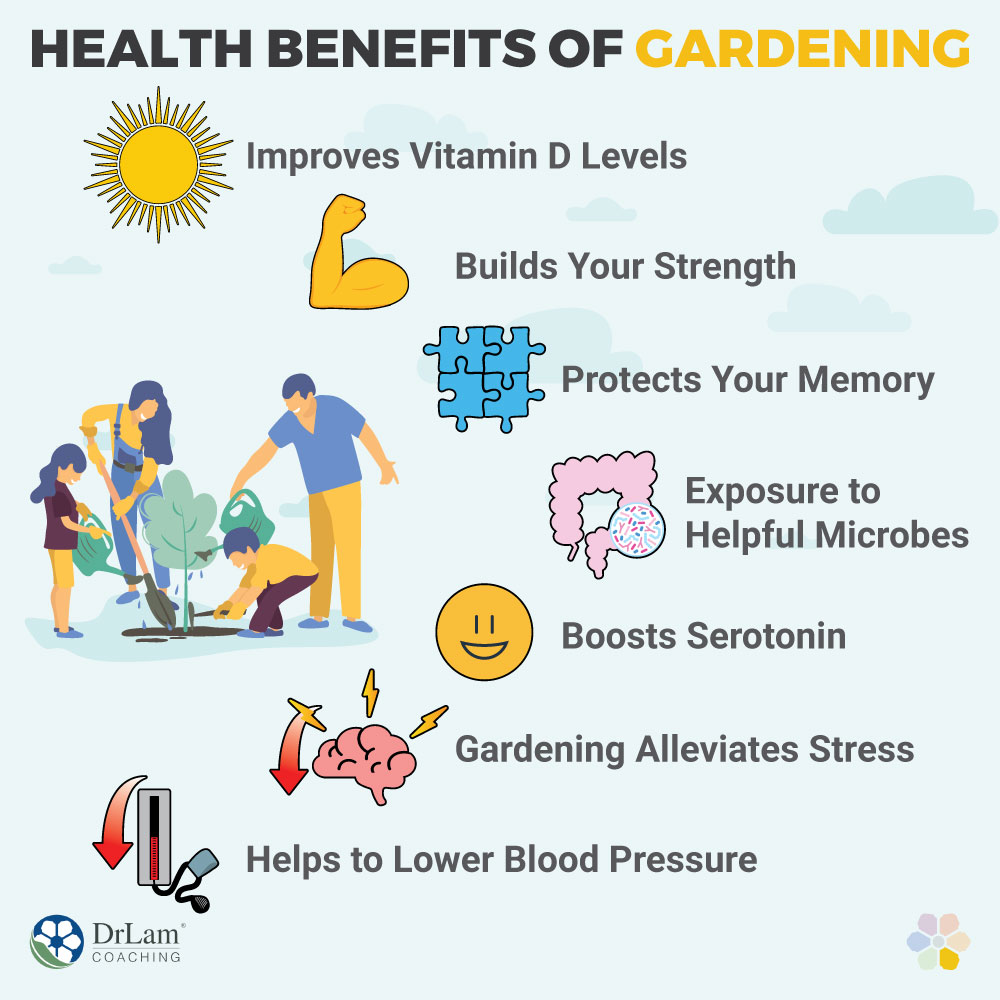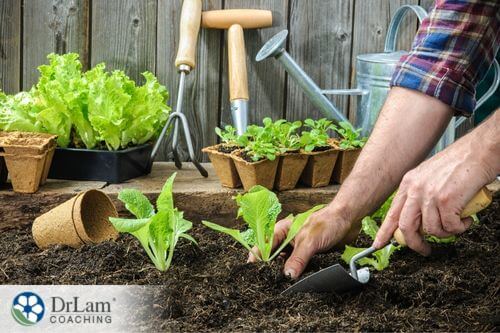Gardening is not simply an enjoyable outdoor activity that you do in your spare time. It’s an opportunity to improve your health! The benefits of gardening include a boost in gut health, improving physical strength, mood enhancement, stress alleviation, blood pressure reduction, and bone and memory protection.
 Gardening can be time-intensive, but it also comes with some advantages. Here’s a look at a few good reasons to start gardening:
Gardening can be time-intensive, but it also comes with some advantages. Here’s a look at a few good reasons to start gardening:

There are several ways gardening can improve your health.
If you do outdoor gardening, you have the opportunity to perform your gardening tasks in the sunshine. As, such, exposure to sunlight enables your body to synthesize vitamin D, which is an essential nutrient that the body needs. Vitamin D helps with the absorption of calcium in the foods you eat, and in turn, promotes optimal bone health. Also, it helps to keep the flora in the gut microbiome balanced.
One of the benefits of gardening is that it can help to boost your physical strength. Gardening is a physical activity, and you can view it as a form of low-level exercise. It often involves performing physically exerting tasks, from weeding to carrying heavy pots. You can achieve a light to moderate amount of exercise by performing gardening activities. This help to build your strength.
As a form of exercise, gardening is highly beneficial for brain function, and in turn, this helps to protect your memory. Also, performing activities like raking and planting can help to stimulate brain nerve growth factors, according to research. You can also sharpen your memory when you rely on recall to perform certain gardening tasks.
Gardening involves exposure to many different varieties of helpful microbes in the soil. These can improve the health and strength of the microbiome in your gut. Studies show they can also boost mood and increase the production of serotonin.
Garden soil is packed with strains of good bacteria that may help stimulate your brain to release the neurotransmitter serotonin. This “feel-good” chemical is known as a mood booster and can help in alleviating the symptoms of depression and also boost your immune system health.
The bacterial strain Mycobacterium vaccae is found in soil and has been shown to positively support mood and reduce anxiety-related behaviors in mice. This may be achieved by activating serotonin neurons and neurons linked to immune system response.
If you are someone dealing with high stress levels, gardening can help remedy that situation. It works by lowering the degree of stress hormones in your body. It allows you to focus on the present moment in a soothing atmosphere. Furthermore, since gardening boost mood and serotonin, it can also help alleviate anxiety and increase feelings of calm.
 High blood pressure is a crucial risk factor for cardiovascular events, and if left untreated, it could lead to serious health problems and even death. Another important benefit of gardening is that it can help to lower blood pressure levels. Since gardening activities can reduce stress and boost mood, it naturally reduces your blood pressure.
High blood pressure is a crucial risk factor for cardiovascular events, and if left untreated, it could lead to serious health problems and even death. Another important benefit of gardening is that it can help to lower blood pressure levels. Since gardening activities can reduce stress and boost mood, it naturally reduces your blood pressure.
Also, caring for your plants allows you the opportunity to lower your blood pressure and care for yourself in the process. Also, you improve your cardiovascular health as your blood pressure drops.
One especially significant area of the body that gardening can help is the microbiome. The microbiome, made up of bacteria in the gut, affects inflammation throughout the body. If the population of helpful and harmful bacteria in your gut is unbalanced, then inflammation can occur, leading to health problems. This change in your gut bacteria is called dysbiosis. Stress can cause or worsen this imbalance, increasing levels of inflammation.
Chronic stress is a common condition, but can lead to Adrenal Fatigue Syndrome (AFS). This is caused by overstimulation of the NeuroEndoMetabolic (NEM) stress response, which causes a spike in cortisol levels. This level of activation and increased stress contributes to dysbiosis of your gut and consequently a decrease in gut health. The Inflammation circuit of the NEM, consisting of the immune system, GI tract, and microbiome, is heavily affected by these changes.
In turn, the gut becomes permeable and allows more toxins and bacteria to cross the epithelial barrier. Some of the symptoms of AFS, like brain fog, tiredness, and headaches are also symptoms of an underlying gut imbalance.
Additionally, some gastrointestinal symptoms that are directly related to advanced adrenal fatigue include bloating, constipation, food intolerance, gastric discomfort, diarrhea, and intolerance to medications. You may experience an improvement in these symptoms when your gut microbiome is balanced.
With gardening, you could potentially improve your gut health by optimizing your body's microbiome. In turn, this may minimize stress and inflammation linked to AFS.
Garden soil can contribute to a healthy gut microbiome in humans by providing beneficial gut microorganisms. Researchers believe that persons who garden have more diverse gut microbiomes than those who do not. In essence, contact with garden soil and its microbiome shifts the composition of a person's gut microbiota and stimulates a boost in gut health.
Soil microbes can transfer and remain on your skin after you have completed your gardening. As such, soil microbes have the potential to minimize inflammation, interact with the immune system, and enhance mental health. For instance, the soil bacterium Mycobacterium vaccae is linked to positive impacts on stress tolerance and a lower prevalence of allergies in children because of greater exposure to farming environments.
 One of the most essential benefits of gardening is that you can improve your gut health by planting particular foods. You can transform your gut health with gut-healthy food options in your diet. Simply grow the food you need to sustain a healthy gut or improve it. Some food that you can add to your diet for gut health includes:
One of the most essential benefits of gardening is that you can improve your gut health by planting particular foods. You can transform your gut health with gut-healthy food options in your diet. Simply grow the food you need to sustain a healthy gut or improve it. Some food that you can add to your diet for gut health includes:
Consuming more soluble fiber foods will provide your gut microbes with nourishing food they love. Fruits and vegetables are ideal foods that can provide an ample supply of soluble fiber called oligosaccharides. This fiber easily dissolves in water, aiding in its breakdown by gut bacteria. Also, soluble fibers in your diet are great for reducing inflammation and endotoxins. Beans, broccoli, carrots, pears, and apples are all great sources of soluble fiber that you might add to your garden.
These are of the unprocessed variety. Overly processed grains, while easier to digest in the intestinal tract, fail to reach the microbiome. As a result of this, your gut bacteria don’t get fed so that they can go to work and provide the benefits that your gut needs for optimal health. Excellent sources of whole grains that you might grow in a garden include oats, millet, barley, and quinoa.
If you are looking for foods with high levels of good bacteria that can help your gut, fermented foods are excellent sources. Fermentation is a great way to preserve garden produce as well. Sauerkraut, for example, can be made with your own cabbage. You can also ferment other garden produce, like tomato salsa or pickles. Be sure to use safe fermentation practices though.
Gardening isn't just a great way to get healthy foods and make your yard look beautiful. The benefits of gardening include the reduction of stress, inflammation, and blood pressure, bone and memory protection, and a boost in mental health and physical strength. Additionally, you can experience an improvement in gut health from contact with the soil microbiome.
If you are concerned about your gut health and would like assistance in determining natural ways to improve your microbiome, the team at Dr. Lam Coaching can help. We offer a free** no-obligation phone consultation at +1 (626) 571-1234 where we will privately discuss your gut symptoms and various options. You can also send us a question through our Ask The Doctor system by clicking here.
You can enjoy a range of benefits from gardening. Your physical and mental health can be improved when you participate in gardening activities. Some specific benefits include gut health optimization, inflammation and stress alleviation, muscle and bone strengthening, memory protection, and blood pressure reduction.
